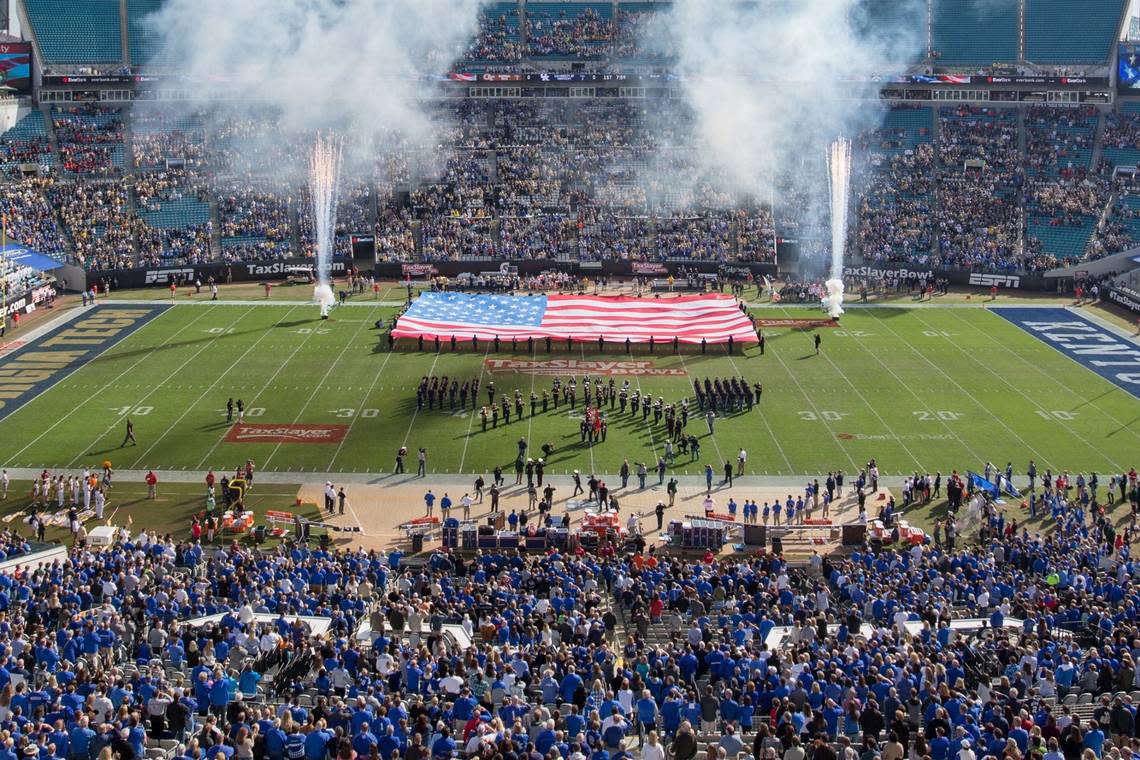Five good Kentucky football questions (and answers) about Friday’s TaxSlayer Gator Bowl
The University of Kentucky is headed to Jacksonville, Florida, this week to play in a bowl game for the eighth consecutive season. The Wildcats (7-5) will take on 22nd-ranked Clemson (8-4) on Friday at noon (ESPN) in the TaxSlayer Gator Bowl at EverBank Stadium.
Here are five questions and answers about the game:
What is a TaxSlayer and how did that come to be the bowl’s name?
TaxSlayer.com is a financial technology company based in Evans, Georgia, that provides online tax preparation software for Americans who file their taxes electronically. TaxSlayer.com formed a partnership with the Gator Bowl before the 2012 game to become the bowl’s title sponsor. In 2014, the TaxSlayer.com Gator Bowl shed its traditional name and was renamed the TaxSlayer Bowl as part of a new six-year contract with the sponsor. However, in 2018 the event’s board of trustees announced that “Gator” would be reinstituted as part of the bowl’s name.
Is this a high-level bowl game?
The TaxSlayer Gator Bowl paid out $5,350,000 last year, ranking it among the top 10 bowls in payouts after the College Football Playoff and New Year’s Six games. Not a bad tier, considering there are 43 total postseason games.
The Gator Bowl also owns a prominent position on the bowl schedule this year, kicking off a New Year’s weekend of 13 games spanning from Friday through Monday that concludes with the College Football Playoff semifinals. The Gator Bowl is one of four games Friday but has the first two hours of the day to itself. The noon game in Jacksonville is followed by the Sun Bowl at 2 p.m. (Oregon State vs. Notre Dame), the Liberty at 3:30 p.m. (Iowa State vs. Memphis) and the Cotton Bowl at 8 p.m. (Ohio State vs. Missouri).
How long has this bowl been around?
The first Gator Bowl was played in 1946 and the game has been played continuously ever since. This year’s edition will be the 79th. It is the sixth-oldest bowl and, in 1955, became the first one to be televised nationally. The game is widely respected in the South and has produced numerous memorable college football moments, none more so than the 1978 game. That was the night legendary Ohio State coach Woody Hayes ended his career with the Buckeyes by punching a Clemson player who intercepted a pass late in the Tigers’ 17-15 victory.
Many of college football’s biggest names have played in the bowl, including Heisman Trophy winners Lamar Jackson, George Rogers, Pat Sullivan, Earl Campbell, and John David Crow. The game has also featured Dan Marino, Thurman Thomas, Archie Manning, Larry Csonka and Peyton Manning. A Gator Bowl-record crowd of 84,129 saw Bobby Bowden coach his final career game for Florida State, a 33-21 win over West Virginia, on Jan. 1, 2010.
Florida and Clemson, with nine appearances each, have played in the game the most times. Notre Dame won last season’s Gator Bowl, defeating South Carolina 45-38. Kentucky has played twice previously in the Gator Bowl, falling to Georgia Tech 33-18 on Dec. 31, 2016, and beating North Carolina State 23-21 on Jan. 2, 2021.

What is EverBank Stadium in Jacksonville like?
The home of the TaxSlayer Gator Bowl opened in August 1995 as Jacksonville Municipal Stadium, on the shores of the St. Johns River. It replaced the old Gator Bowl, which was demolished to make way for the new stadium. The venue was renamed for EverBank Financial Corp., in 2010. EverBank Stadium seats 67,838 and is the home of the NFL’s Jacksonville Jaguars. Temporary seats can be added behind the south end zone — expanding the capacity to well over 82,000 — for the annual Florida-Georgia game or a Super Bowl.
The Jaguars played on the road Sunday and won’t play again in Jacksonville until Dec. 31, two days after the Gator Bowl. The stadium’s playing surface is Bermuda grass and is typically rated among the best fields in the NFL. However, questions about the turf’s safety surfaced during October’s Florida-Georgia game which was played shortly after the field was re-sodded by the city.
The stadium underwent a $63 million renovation prior to hosting Super Bowl XXXIX in February 2005. Additional renovations took place in 2014 and in 2018. The stadium is known for its massive video boards, installed in 2014, which are among the largest in the world. One overlooks each end zone. Each is 60 feet high, spans 362 feet in width and includes 35.5 million LED bulbs. The stadium also includes cabanas and swimming pools. The west side of the stadium is normally reserved for the SEC school.
What can I do in Jacksonville other than watch football?
The Gator Bowl hosts numerous events linked to the game during the week, including a coaches luncheon, a 5K run, a nightly light show and pep rallies. Jacksonville is a city of more than 950,000 in northeast Florida with ocean beaches, inland waterways, parks, major golf courses, museums, historic neighborhoods, and plenty of dining and nightlife — pretty much something for everyone. The average high temperature in Jacksonville on Dec. 29 is 67 degrees, with the average low 45. The record high for Dec. 29 is 83 degrees. The record low is 20. This year’s long-range forecast calls for mostly sunny skies with a high of 57 and a low of 39.
Friday
Kentucky vs. No. 22 Clemson
What: TaxSlayer Gator Bowl
When: Noon
Where: EverBank Stadium in Jacksonville, Florida
TV: ESPN
Radio: WLAP-AM 630, WBUL-FM 98.1
Series: Kentucky leads 8-5
Last meeting: Clemson won 21-13 on Dec. 27, 2009, in the Music City Bowl at Nashville, Tennessee
